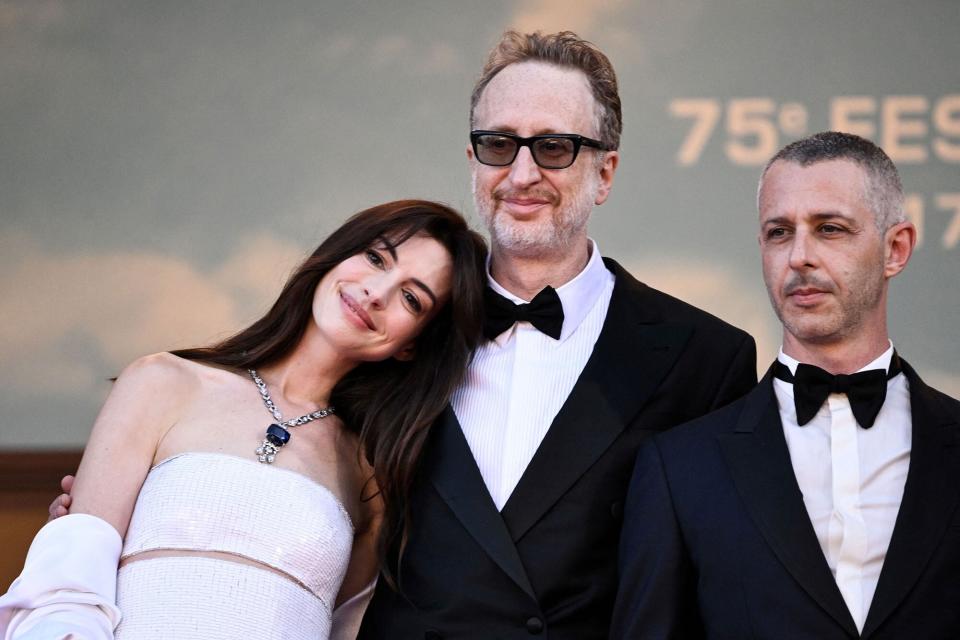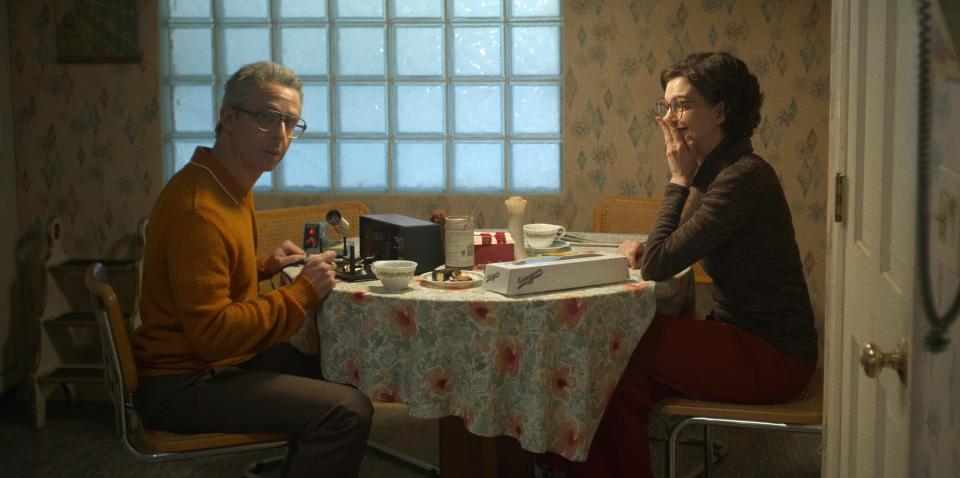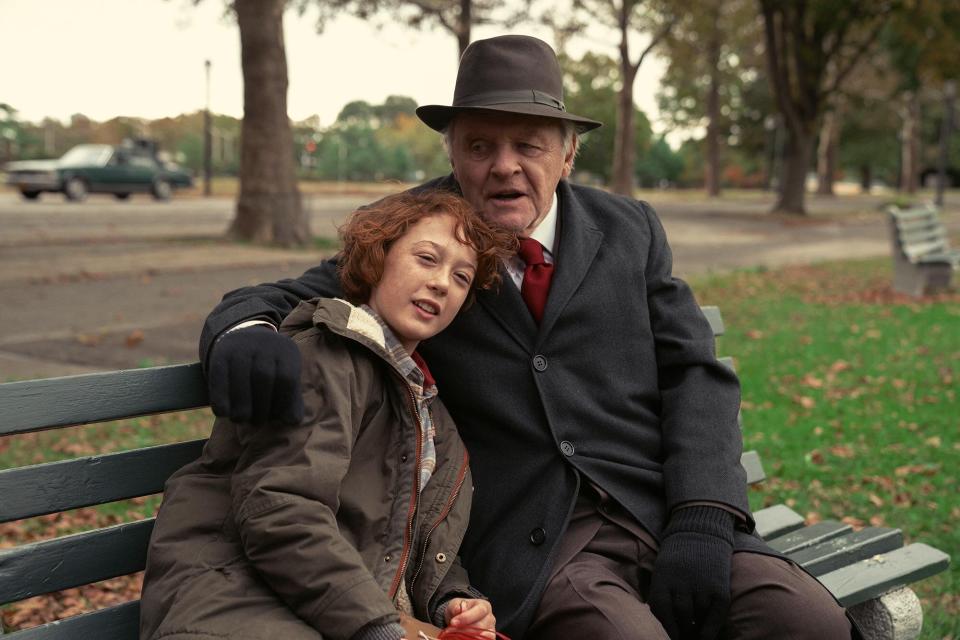Armageddon Time 's James Gray: 'Cinema may not be here forever'
- Oops!Something went wrong.Please try again later.
- Oops!Something went wrong.Please try again later.
- Oops!Something went wrong.Please try again later.
- Oops!Something went wrong.Please try again later.
It's easy to walk into a Telluride hotel suite with a list of questions for James Gray about Armageddon Time, the bittersweet coming-of-age drama he's there to debut for a North American audience on a bright high-altitude September day. It's less easy to get through that list with a writer-director whose passion for film and filmmaking quickly spills beyond queries about Armageddon's autobiographical details and Reagan-era setting, or where the movie lands in a career that spans from his 1994 festival-darling debut Little Odessa to wide-scale Hollywood productions like We Own the Night and The Lost City of Z.
He's happy to talk about his starry Armageddon cast, which includes Anne Hathaway and Succession's Jeremy Strong as stand-ins for his late parents, and Oscar winner Anthony Hopkins as his courtly grandfather, or the challenges of re-creating the working-class Queens of his circa-1980 youth — even his adolescent run-ins with a certain famed real estate family helmed by a hard-boiled patriarch named Fred Trump. But Gray, 53, is just as eager to range far and wide on the politics of Cannes walkouts, the roulette wheel of pandemic-era casting (De Niro! Blanchett! Hopkins!), and what Mozart and Mark Rothko can teach us about movies.

LOIC VENANCE/AFP via Getty Images Anne Hathaway, director James Gray, and Jeremy Strong at the Cannes Film Festival in May.
ENTERTAINMENT WEEKLY: Where did the idea of Armageddon Time start for you?
JAMES GRAY: In some ways, it's your whole life, right? But what happened was I was in Paris for a commitment to do an opera, Mozart's The Marriage of Figaro. My wife and children hadn't come to meet me yet, so I was living in this very nice apartment in a residential area of Paris. I was very lonely and having very strange dreams. I had made two films back to back that were extremely difficult on me physically. I had gone to Amazonia [for 2016's Lost City of Z] — I mean, obviously it's not a place that wants you to shoot a movie there — and after that, I had a very difficult experience on Ad Astra, where you're putting actors on wires and they're acting in a green box.
Anyway, so I thought to myself, What are you doing? Why not go back to your interior life, to what's personal, and stop creating any distance between you and the work? And I just started to think of a movie by Federico Fellini called Amarcord. It's a bit of a fantasia — not his life, really, and yet it is. And I hate to get too political, but I saw an analogous line between Mussolini and Trump.
You notice all this stuff in Amarcord about Mussolini which is very powerful, because what it does is it tells you that, as ridiculous as the characters can be in that film, the undercurrent that you take from it still is that in a few years the country will be basically destroyed, that war is coming. And it lends a kind of darkness to what is also funny and beautiful. So I remembered my own run-ins with [the Trump] family, and I remembered this passage of my life, when I lost a very good friend of mine. I was a screwy kid in many ways. And so I started planning it then by myself in Paris, of all things. I'm sorry. I've given you way too long an answer. [Laughs]
Well, you covered a lot.
The answer, really — always as a creative person — is to be as personal as you can. Because there's only one of you and the more personal you make it, the more specific it becomes. And the more specific it becomes, the more authentic it becomes.
During lockdown I watched about 150 movies with my kids, who were about 15, 13, and 11 at the time. I showed them, you know, the staples of world cinema, Seven Samurai and The Bicycle Thief, 400 Blows, The Godfather, The Godfather Part II, Raging Bull, American In Paris, Singin' in the Rain. The 400 Blows struck me because it's Truffaut being as honest as he can with us, and I think that's beautiful.
It does feel like a real era right now for these very personal films from established directors — Bardo, Licorice Pizza, Joanna Hogg's Souvenir triptych, The Hand of God.
Paul Thomas Anderson says it's because we're all getting old. [Laughs] He said it as a joke but I think that's at least part of it. We live under the mistaken impression sometimes that forms of art last forever, and it's just not true. I mean, opera, for example — there was a period of about 120, 140 years where opera was the popular art form. Four hundred thousand people lined the streets for Verdi's funeral. Puccini actually died before he could finish Turandot, that was 1925. And within a span of about four or five years after that, they were writing fascist operas with huge budgets, and the art form just died.
The reason I'm bringing that up is that, you know, cinema may not be here forever. And I think when you see the studios make an investment only in one type of movie, you get the sense that the art form is going through something very difficult and very unpleasant. I'm not bad-mouthing comic-book movies or anything — it's great to have them as part of the mix. But if you have only one kind of movie that the studios will make, a kind of sclerosis sets in. And so you have an audience that's actually been inculcated only to enjoy those kinds of movies. And then you start to get a smaller and smaller box for the art form.
And when the medium is in trouble, there's a kind of artistic rebellion en masse, an idea to say, "No, Doctor Strange in the Multiverse is not the only thing that there is to tell the story of." I'm not shitting on that. What I am saying is that there has to be more. Let's say you walked into the Metropolitan Museum of Art. Part of why I like it more than the Prado or the Louvre, as much as I love those museums, is that I can look at Aristotle with a bust of Homer by Rembrandt, and they have great Vermeers, but I can also look at Mark Rothko. It's that incredible range, which is what makes us human. It's what makes us — dare I use the word — beautiful.
There's been a lot of talk about the disappearance of the mid-range movie, almost like it's gone the way the middle class in this country. But we're also confronting the loss of a certain monoculture, where we all experienced entertainment more or less together.
When the Beatles were on The Ed Sullivan Show, not a single hubcap was stolen in the city of New York. It's true! Everybody was at home watching them. [Laughs]
But you raised something very important which I think is critical, and it is the central crisis of our age. You talked about the decline or the disappearance of the middle class, the middle movie, all of that. It stems from the number one unanswered question that no policy maker has an answer for, and I don't have an answer for: Nobody has figured out how to monetize integrity.
Like a school teacher, right? It's a very virtuous job, but it doesn't pay anything. So what do you do when a society does not prioritize integrity in any way? You get Donald Trump, a totally transactional figure. American capitalism has done a brilliant job of getting rid of the idea that doing something that doesn't make you a trillion dollars actually matters.
Though when we talk about how movies used to be, the golden age of cinema or what have you, we also forget sometimes to acknowledge how poorly a lot films did that are now considered classics — It's a Wonderful Life, a total flop. Dazed and Confused made about $10.
Yeah. It's a Wonderful Life was a disaster! It almost destroyed [Frank] Capra's career. It kind of did, actually.

Focus Features
To get back to Armageddon, how hard was it for you to recreate the Queens of your childhood physically? New York obviously didn't stand still for 40 years.
The truth is we went back to my street. Where the kid lives in the movie is 90 feet south from my house. The public school that they're walking outside in the beginning, that's my public school. And the truth is, Queens is physically more or less untouched.
Culturally, it's very different — it used to be Archie Bunker Central. We were the lone Jewish family on the block. In fact, we shared our house, which is a semi-attached row house, with a guy who looked, talked, acted exactly like Carroll O'Connor and even had a flagpole put in just a little bit to his side so that they knew who the real Americans were. [Laughs] I quite like Queens now more than I did when I grew up there.
I want to talk about the casting for a minute, because it seemed like an unusual amount of musical chairs: Oscar Isaac was an early hire who had to drop out, Robert De Niro's name was in the mix. You even had Cate Blanchett on board at one point to play Donald's sister Mary Anne Trump — which is only one scene, but she gives this very fiery speech at the school that your stand-in, Paul (played by the charming ginger-haired newcomer Banks Repeta) goes to.
Well, after I wrote the script I went off and cast it, and then the pandemic hit. And everybody's schedule got totally screwed up. I actually think Bob De Niro and Cate Blanchett are credited [in the final film]. Bob was very helpful to me on the script, he was very involved. He actually helped me get the film made. But then he went off to do Marty Scorsese's movie, which shot for a long stretch.
"Fine, Bob!"
[Laughs] Yeah, I mean, what am I gonna say? "Don't do that"? And with Oscar, the same thing happened. the project he was working on got pushed over because of COVID. But you know, it's weird with movies — sometimes they get made the way they should get made.
In the case of De Niro, he was going do a much more blue-collar version of my dad's father. My mother's father was exactly like Tony Hopkins — he was very urbane, very Tony, very well spoken. My father's father was more of a bruiser, a plumber in Brooklyn. So I had to rewrite the character.
But it worked out exactly the way it's supposed to because my mother more or less had a nervous breakdown when my grandfather died, and she never really recovered emotionally from it. So I'm not happy that Bob couldn't do it — I love him and I've wanted to work with him for a long time. But when Tony came on board it unlocked a lot of the story. And it became totally true to what the story actually was.
I confess to you, I did not know Jeremy [Strong]'s work. He came on after Oscar, and I then had to watch Succession, because I'm not a TV person. I thought, Wow, this guy's great. And Andy [Anne Hathaway] was in it from the beginning. Cate was going do that Mary Anne Trump thing for a day, and then she went up doing Mr. [Todd] Field's movie [TÁR], so she was unavailable to come. But she was so great. She was like, "Darling, I'll do a green screen on the weekend in Berlin." But then Jessica [Chastain] became available.

Anne Joyce / Focus Features
What was it like to get that seven-minute standing ovation at Cannes? Did you have your Sally Field moment, "They really like me"?
Well, Cannes, I have a love-hate relationship with. I've had a ton of movies go there — The Immigrant, Two Lovers, We Own The Night, The Yards. And I like to say they love movies there like a dog loves meat.
This is a confession: Everyone said to me, "Oh, you were crying. Were you moved by the ovation?" No, I was tearing up because my father had died a month before that of COVID.
Oh, I'm so sorry. Did he get a chance to see a cut of the film before he passed away?
No, it is a shame. It's a regret. I mean, he was quite old and we were on very good terms. But I was tearing up because we had talked about maybe getting him to Cannes, and he didn't make it.
But honestly, I felt like I escaped — like, Okay, good. They didn't boo. I've been on the jury, and they have these seats there when you get up, they go thwack. I was watching a movie made by a great director, which I won't say the name of, and maybe within the first 30 minutes, half the audience had walked out. So you keep hearing, thwack-thwack-thwack-thwack. And you live in terror that that is what will happen to you. So you asked how I felt, my feeling is relief.
I spoke to you a few years ago when I was writing a profile of Brad Pitt for Ad Astra, and I had asked him whether he'd be interested in following some of his movie-star peers into serial television. He said actually he'd really embrace it, because he loves the possibilities there for longer-form storytelling. And I see that you have a credit for an episode of an upcoming Norman Mailer series on IMdB. Are you hearing the siren call of TV too?
I do, for certain things. Scenes From a Marriage was originally done for television. The Dekalog, by [Krzysztof] Kieślowski. It's the realm of snobbery to say that you wouldn't because if you're working in a certain form, then it's beautiful. I mean, Sergey Bondarchuk made War and Peace for Russian television, and it was eight hours long. If I said to the head of Focus, who's a great guy, "Peter, I have an eight-hour-long movie. Can you distribute it?" There's no way that he could. He can't.
Although you know, something like 45 percent of Americans now have theaters at home, which is a flabbergasting number. I'm very lucky, I have a 110-inch screen with a projector and the popcorn machine, the whole thing. But there's a thing people don't talk about that I think is the problem: "I pressed pause, I got up and I pissed. Then I checked my phone. I wanted to reheat the shrimp jambalaya I had yesterday....You know what? I'm gonna watch the second half tomorrow."
When you were a captive audience, it meant that the filmmaker, the screenwriters, the director, whatever, we had to be experts at saying, "Here are a series of rising tensions that build throughout a 110 minute, 120 minute period that make going to the bathroom the least pleasant thing you can do. You need to see what's gonna happen." And so, I think that like a muscle, it gets a little flabby if you don't use it.
You mentioned It's a Wonderful Life, but if you were making a studio picture in 1943 or whatever, and you took the film and previewed it in say, Pasadena — and the preview audience was, by the way, quite different in 1943, although they still made their big mistakes, look at Orson Welles. But if they had a problem with this or that, all of a sudden Darryl Zanuck, Louis B. Mayer or whoever it was would say to you, "The story doesn't work in this section." That was a Monday. Tuesday, you got Ben Hecht to rewrite the scene. Wednesday, you got Cary Grant off stage seven and Ingrid Bergman off stage nine. You brought them back in to reshoot, right? Then you could cut it in on a Thursday, and on Friday, you could screen a whole new version of the movie.
So the stories functioned brilliantly. They kept perfecting them. Reshoots are the unsung hero of those old movies. Today, you cannot do reshoots unless you have an exorbitant budget. And even if you had all the money in the world to get the actors... You know, we now shoot in Australia, Belarus, Bucharest. It's impossible to get everybody together again.
And also of course, the stars of that era were often locked into their studio contracts. They literally couldn't say no.
They could not say no. Cary Grant didn't want to do The Awful Truth, the Leo McCarey film, which is a beautiful movie. He offered to pay back the studio out of his contact. He said, "Please don't make me do it! This is comedy, I'm a serious actor." He did it. The rest is history.
Related content:

